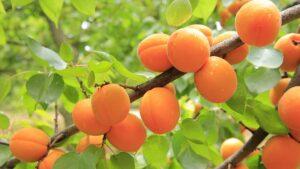Apricot plantations need to be reorganized
The spring frost in 2025 caused serious damage to domestic apricot plantations. The market would have a great demand for the fruit, therefore, in the interest of crop security and the economy of production, a comprehensive, professionally sound reorganization of domestic fruit production is needed in the future. In terms of variety selection, it is crucial that apricot varieties that have been adapted to the domestic climate through several years of testing should be put into commercial production. In order to improve production, NAK and MATE will launch a comprehensive research and development project this year in cooperation with producers.

(Photo: Pixabay)
Although spring frosts have caused serious headaches for domestic apricot growers in recent years, this year the plantations suffered such severe damage due to the prolonged cooling and frosty period during the spring flowering period that 70-95 percent of the crop was destroyed. The frost did not only hit our country – the spring cooling also caused significant damage in the most important apricot-growing countries in Europe – but the extent of the frost’s impact is the greatest here. There are several reasons for this: in addition to weather anomalies, a fundamental problem is that the majority of our domestic apricot plantations are located in areas that are ecologically less suitable for apricots or unsuitable for planting.
Apricots are grown on approximately 5,000 hectares in our country
The most important growing regions are concentrated in Pest and Bács-Kiskun counties, as well as in Borsod-Abaúj-Zemplén (1,100 hectares), Somogy and Tolna counties, but there are also significant plantations in Fejér county. However, due to the drastic frost damage that occurred in recent years, the previously initiated expansion of the growing area has stopped; Between 2013 and 2020, the area of plantations increased from 4,000 hectares to 5,700. Due to serious frost damage occurring year after year, the annual yield shows significant variation. While before 2018, the harvested quantity ranged between 20 and 35 thousand tons depending on the vintage, in 2023 only 6-8 thousand tons of apricots were produced in the country.
The goal is 50 thousand tons of apricots
According to what was said at the professional day organized by the National Chamber of Agriculture and the Cegléd Research Station of the Fruit Production Research Center of the MATE Institute of Horticulture, the goal would be for the sector to reach an annual yield of 50 thousand tons, which would also reduce the 3,000 tons of imports arriving in our country annually. Apricot is a very popular fruit species among consumers and processing plants, and fruits of the right quality can be sold without any problems at a good price. Therefore, the increase in apricot production must be encouraged, and producers and farmers must be provided with modern, realistic professional information that points to the future. All of this is supported by the fact that domestic fruit production, and especially our early-flowering fruit species, requires a comprehensive reorganization based on professional foundations for the successful and economical production. The application published this year to support fruit planting, renovation, and modernization provides an excellent opportunity for our fruit production to be renewed. However, this can only be achieved if we can plant varieties that are suitable for climate change, adapted and suitable in our country through durability tests, and that also meet market needs. According to experts, the right choice of growing location, active frost and ice protection and the application of intensive cultivation technology play a key role in achieving crop security. NAK and MATE intend to maintain close contact in the development of domestic fruit production, in order to be able to transfer the most up-to-date scientific knowledge to farmers in a way that is understandable to the public. To this end, a comprehensive research and development project will be launched this year with the professional coordination of NAK, in cooperation with universities, research institutes and producers. The goal is to have well-performing varieties suitable for the domestic climate and growing conditions, as well as the corresponding cultivation technology – thereby ensuring a uniform commodity base of the appropriate quantity and quality for consumers and processing plants.
A variety, and this is especially true for early-flowering apricots, should only be put into commercial cultivation after several years of appropriate economic value testing
The main problem at present is that the majority of varieties were bred in Mediterranean countries, where the primary consideration is to ripen as early as possible. This is based on the short cold requirement and deep dormancy period, which is usually accompanied by early flowering, but this poses a huge risk in our country. Therefore – even through state regulation – it must be ensured that only varieties that have undergone several years of preliminary testing and thus are suitable for domestic conditions can be planted in commercial cultivation, mainly from state funding. This is in the common interest of the planter and the state.
NAK
Related news
UBM may continue its international expansion
🎧 Hallgasd a cikket: Lejátszás Szünet Folytatás Leállítás Nyelv: Auto…
Read more >Related news
Festival buzz at the 60th anniversary EuroShop trade fair
🎧 Hallgasd a cikket: Lejátszás Szünet Folytatás Leállítás Nyelv: Auto…
Read more >Historic price reduction at ALDI
🎧 Hallgasd a cikket: Lejátszás Szünet Folytatás Leállítás Nyelv: Auto…
Read more >A stable compass in the Hungarian FMCG sector for 20 years
🎧 Hallgasd a cikket: Lejátszás Szünet Folytatás Leállítás Nyelv: Auto…
Read more >









